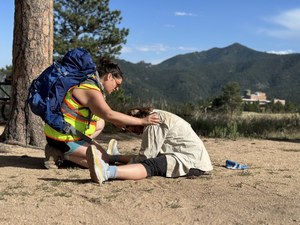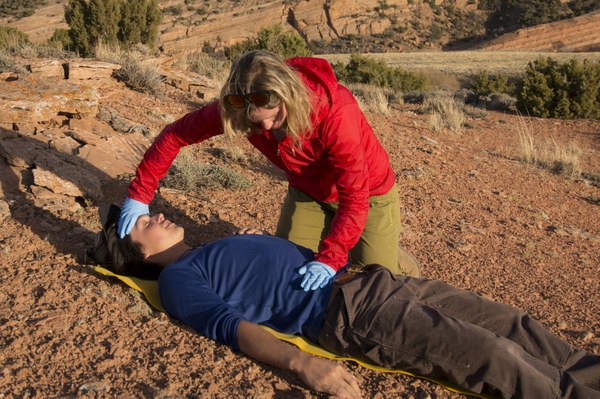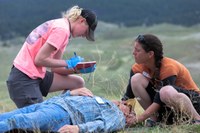Wilderness First Aid classes have proven to be a valuable risk management asset for those traveling in our rugged Rocky Mountains. Classes such as the Colorado Mountain Clubs newly revised and upgraded WFA offerings graduate students who have practical, accurate and relevant emergency medical skills. Unfortunately, without ongoing attention, these skills can deteriorate rapidly.
A seminal analysis of the knowledge retention of WFA responders (Schumann, 2012) found measurable skill loss as soon as four months after graduation and progressive deterioration of retention thereafter. This phenomenon is not isolated to WFA graduates. Similar skill fade has been found amongst those trained in CPR, military combat medicine, nursing, EMS, etc. (STO, NATO, 2023). A common characteristic of such loss seems to be a lack of regular practice of the acquired techniques, basically a “use it or lose it” phenomenon.
After decades of outdoor recreation, with more than my share of emergency encounters, I have been among those who have struggled to retain my WFR skills. What follows are some methods and resources I have found work best to keep up to date.

RECERTIFICATION CLASSES
Try hard to take recertification classes within the time period designated by the training organization. Most often this is two to three years. This can be a repetitive chore but today there is a growing reciprocity amongst various WFA course providers. You can keep things fresh by learning from different education organizations. Take advantage of the optional approaches they employ, such as convening in or near national parks and outdoor venues, 100% on-line classes or hybrid classes. And enjoy the diversity of fellow students who are likely to have amazing, real-life experiences to add to the training. A fantastic mix of recertifying river guides, expedition outfitters, forest rangers, arborists, horse packers, trip leaders and experienced mountaineers that you encounter in these classes help maintain high interest and make attendance fun and worthwhile.
SELF REHEARSE KEY SYSTEMS
The Patient Assessment System (PAS) is foundational and universally used in all WFA encounters. Its step-by-step routine is designed to cut through the fog of a wilderness crisis and assure one is employing sound emergency medical procedures. I live near wilderness areas and am able to hike frequently. If I take solo hikes, I find they are great for practicing PAS skills. After I settle into a hike, I imagine that I have come upon an injured hiker, biker or climber. As I hike, I mentally walk through the PAS stages starting with scene size up, progressing through primary assessment, secondary assessment, vital signs, SOAP note, etc. Steps I am weak on or have forgotten (usually something like normal adult heart and respiratory rates or what each letter of O.P.Q.R.S.T and S.A.M.P.L.E. stand for), I make a note of them. When I return home, I look up the correct information in my first aid texts and mentally refresh the missing information.
PODCASTS
A specialty of the University of Utah, School of Medicine, is its numerous offerings related to Wilderness First Aid. Also sometimes called Wild Med U, its physicians offer the public a wide range of quality podcasts, video and websites related to Advanced Wilderness Life Support, Search and Rescue and Wilderness First Aid. They provide an extensive variety of relevant topics which are worthwhile to connect with if you are seeking a refresher on a particular first aid-related topic.
PRACTICE TESTS, CASE STUDIES AND SCENARIOS
The National Outdoor Leadership School deserves its reputation as the Harvard of Outdoor Education. Their website offers dozens of WFA case study scenarios which are ideal for challenging ones recall and problem solving skills. Its on-line multiple choice tests refresh your skills and electronically provide gentle coaching and correction should you give a wrong answer. Subscribe to their free email postings and you will receive on-going WFA educational updates. Most notably, they provide thoughtful curriculum revisions when new science-based research suggests practitioners change current practices.
http://www.nols.edu/en/wilderness/resources/

WILDERNESS MEDICINE JOURNALS
If your on-going learning requires scientific data in the wilderness medicine field, it can be obtained through the Wilderness Medicine Society. Their well-regarded publication, Wilderness and Environmental Education Journal, is widely considered the definitive peer reviewed journal on wilderness medicine topics and clinical practice guidelines. When WFA programs and instructors say their curriculums are evidence based, this is usually to whom they are referring. Each major curriculum topic is reviewed every five years and updated as appropriate. And each topic has a briefer, less formal more practical and user friendly summary version is available. They also publish The Wilderness Medicine Magazine. This is a worthwhile read, which can keep your WFA interest alive with columns, interviews and recently emerging controversies.
http://wms.org/magazine/
Retaining your first aid skills and the commitment you have made to help those in distress in the outdoors is a noble undertaking. Try not to consider it as a necessary evil, but rather enjoy it as an opportunity for life-long learning of a compelling topic that just might save a life or two.
Art Hogling is a lifetime CMC member who is a WFA instructor, Master Safety Instructor and Director of the CMC Hiking Safety School. He is the author of the recently published CMC Hiking Safety Handbook.
 Art Hogling
Art Hogling

Add a comment
Log in to add comments.